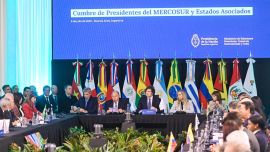Police in Argentina have carried out a series of raids as the courts investigate the motivations behind the massive influx of Russian women who have arrived in the country to give birth in recent months.
According to police and judicial sources, raids began last Thursday in the wealthy City neighbourhood of Puerto Madero as investigators probe reports of an alleged million-dollar business that assists women and men arriving from Russia to settle in the country or obtain citizenship swiftly via birth of their children.
The working theory is that there may be a criminal organisation behind the influx that seeks to take advantage of Argentina's citizenship and immigration rules. Media outlets in Argentina reported over the weekend that the authorities are probing links to espionage activities.
Personnel from the federal police and immigration inspectors were engaged to lead operations on the temporary residences identified by Russian nationals as their base while in the country. Authorities sought to verify whether individuals were at the addresses they provided to the authorities and to check information provided in affidavits to the immigration authorities.
Among the locations visited were a series of high-end hotels, including the Sheraton, the Regente Palace, NH Collection, Aires Express and the Esplendor. Sources said that of the 30 Russian citizens checked last Thursday, only eight were at their stated addresses.
For investigators, who spoke on the condition of anonymity, "it was demonstrated that their intention is to take advantage of the documentary benefits (D.N.I/Passport) that our great country grants to all the good people who want to reside legally in the National Territory."
Argentina doesn’t require entry visas for Russians, incentivising expectant mothers to enter in search of healthcare and citizenship. In addition, any individual born on Argentine soil automatically assumes citizenship. This can also speed up the citizenship process for a child’s parents. An Argentine passport gives its holder access to 170 countries, according to the Henley Passport Index.
Federal Judge María Servini, who is leading the investigation, also requested additional raids on two properties in Puerto Madero (located at 500 Calle Juana Manso and 500 Calle Azucena Villaflor) on Thursday.
During those raids, investigators seized notebook computers, tablets, mobile phones, personal documents, immigration documents, police certificates and money in foreign currency (including dollars and euros) as well as national currency (pesos).
The investigation, according to sources, began after a woman complained to the Federal Police about irregularities in the entry into the country of Russian citizens about to give birth, the birth of their children and the granting of migratory procedures.
After a series of enquiries, Judge Servini requested the raids, and now investigators are analysing what was seized.
Detained at Ezeiza
News of the raids came after immigration authorities detained six Russian women — three on Wednesday and three on Thursday — upon their arrival in the country on the grounds they may have falsely claimed to be tourists.
A few hours later, a further 83 Russian women also arrived in the country on flights arriving at Ezeiza International Airport, 16 of whom were pregnant.
Last Friday night, responding to habeas corpus writs filed with the local courts, Federal Judge Luis Armella authorised the provisional entry into the country of four of the six pregnant Russian women detained at Ezeiza in the preceding days.
A few hours before the judicial order was given, Argentina’s National Immigration Director Florencia Carignano, said in statements to the press that the arrival of the Russian women was being investigated to see if the arrivals were linked to “criminal” gangs.
"The number is really big each day. Last night [Thursday], on the last Ethiopian [Airlines] flight, 33 Russian citizens entered with pregnancies of approximately 32, 33, 34 weeks," Carignano told the TN news channel.
The official said that the Russian boom in so-called “birth tourism” had first been noted last August and that the arrivals all had similar characteristics: they were women in the last trimester of pregnancy who had purchased tourist packages that include a temporary rental contract for a local property.
"We are delighted that they come to make their lives in Argentina, but the problem is that they arrive, [they] have their children, register them as Argentines, leave a power of attorney with their guardians, leave and never come back. There are people here who are using our passport,” said Carignano.
Surge in arrivals
Migration officials confirmed to the Noticias Argentinas news agency that a total of 14,068 Russian citizens, both men and women, entered the country in 2022. Carignano said Friday that in the last three months, some 5,819 pregnant Russian women arrived in the country and gave birth to their children at Argentine hospitals and clinics.
Initial suspicions focused on the potential of a human-trafficking ring and as a result, more than 300 interviews were carried out with arriving Russians. That hypothesis has now been ruled out by the local justice system, sources told Noticias Argentinas, which is now probing the figures behind the organisations that profit from the birth tourism business.
Kirill Makoveev, a Russian citizen resident in Argentina and the founder of RuArgentina, one of the companies offering birth tourism services, rejected claims of human-trafficking in an interview with a local television station.
Speaking to C5N channel, Makoveev said RuArgentina provinces “a quality service, translation, information and support – we do not traffic people.”
He continued: “These are false accusations and these words will have consequences. We are a team, we sell our time. We do not sell passports or ID cards. We sell information on how to get these documents legally.”
Makoveev said his clients were generally from the upper classes and that travel packages for birthing services in Argentina cost at least US$5,500.
"We provide the services that are lacking in the market. Nobody is going to talk to a pregnant Russian woman in Russian here in Argentina, neither in hospitals, nor at the National Migration Office, nor in the courts. So she has to learn to speak Spanish or use our services. Nobody is going to translate for her, or help find a doctor, or a hospital. So we do it ourselves and we charge them for it,” he said.
Responding to comments from Carignano, officials at the Russian Embassy in Buenos Aires denied the officials claims that “false tourism” was being practised, describing it as “a very inaccurate phrase.”
Georgy Polin, the head of the Russian Embassy’s consulate in Argentina, said that the two nations had a non-visa agreement that "enables citizens of the two countries to enter their respective countries with their passports and stay for 90 days for non-commercial purposes, without the intention of settling down.”
Acknowledging that Russian citizens were “arriving in large numbers, between 12 and 15 times more than in other years," Polin told Perfil that the agreement signed in 2009 during the presidency of Cristina Fernández de Kirchner allowed for people to “spend that time visiting a family member, taking a short course of education, [and] doing unpaid work such as volunteering, so it does not cover exclusively tourist purposes."
– TIMES/NA/PERFIL


























Comments